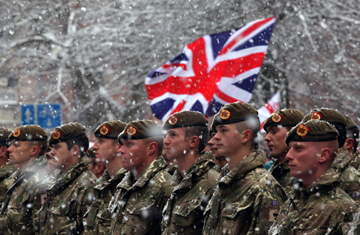
Soldiers of The 1st Battalion Duke of Lancaster's Regiment march through the streets of Blackburn following a six-month tour of duty in Afghanistan on December 1, 2010
British politicians and military chiefs are already fighting an uphill battle in trying to persuade a skeptical public that the operation in Afghanistan is worth the continuing loss of life. The latest batch of WikiLeaks cables, showing U.S. and Afghan officials — including President Hamid Karzai — expressing severe doubts over the U.K.'s effectiveness in the country are unlikely to make that task any easier.
The cables released on Friday highlight concerns from Karzai and U.S. officials over the U.K.'s effort, specifically in the Helmand province. According to one 2008 memo, the U.S. embassy in Kabul reported: "We and Karzai agree the British are not up to the task of securing Helmand." A separate cable from the same period relays Karzai's telling Senator John McCain that he was relieved U.S. marines were being sent to reinforce the British-led mission in Helmand. Meanwhile, then-Afghan foreign minister Rangin Dadfar Spanta is quoted as saying that U.K. troops "were not ready to fight as actively as American soldiers."
The leaks provoked swift responses from both U.K. and U.S. officials. In a statement on Friday, the British Ministry of Defence (MOD) said U.K. forces had done an "excellent job" in the region, specifically Sangin, which they left in September after handing it over to U.S. troops. "Both Afghan leaders and the U.S. Marines have publicly recognized and paid tribute to the sacrifice and achievements of the U.K. forces in that area," said the MOD. And a Pentagon spokesman put out a statement saying that the contribution and sacrifice of U.K. troops during the war in Afghanistan were "certainly recognized and appreciated" in the U.S.
Speaking to the BBC, former U.K. Defense Secretary Bob Ainsworth dismissed the leaks as "gossip" and insisted it was entirely understandable that discussions were going on at the time about the best tactics and operations. "This is not helpful ... for the families and those people who have lost loved ones and the poor infantry slogging their guts out to help the Afghan people," Col. Stuart Tootal, former commander of paratroopers in Helmand, told TIME. "We have to put it in the context that these are individual views of some people and it's in the nature of any alliance that there are going to be internal differences of opinion," he says, adding that the remarks related to a time when the British military in the region was very under resourced. "The idea that British troops were reluctant to fight — well, 300-plus deaths and hundreds of injuries show that just doesn't stack up."
And it is certainly the case that in 2008, when these cables were sent, it was widely argued in the U.K. that the 10,000 British troops then trying to control Helmand simply were not enough and that is why numbers were massively boosted by U.S. forces.
But Friday's cables were met with dismay and anger by those already questioning the continuing operation in Afghanistan, which has lasted 10 years and cost 345 British lives, more than 100 this year alone. Opposition Labour MP Paul Flynn, who has campaigned to bring British troops home, tells TIME the leak could prove a tipping point in public opinion, which already shows up to 70% wanting troops withdrawn from Afghanistan. "These remarks are an insult to the relatives of the fallen," he says. "They display a deep sense of ingratitude from Karzai for British soldiers putting their lives on the line."
A spokesman for the Stop the War Coalition, Andrew Burgin, says: "It is pretty disgraceful to criticize your allies in that way. It will make British soldiers think seriously about what the hell they are doing in Afghanistan."
In November, a NATO summit agreed on a timetable for the handover of operations to Afghanistan security forces by 2014, and the British coalition government has clearly focused its eyes on ending Britain's role in the conflict before the U.K.'s next general election in 2015. But what will worry both the government and the military now is that, whatever the background and historical nature of the cables, they put further pressure on Britain's leaders to bring that end date forward.
